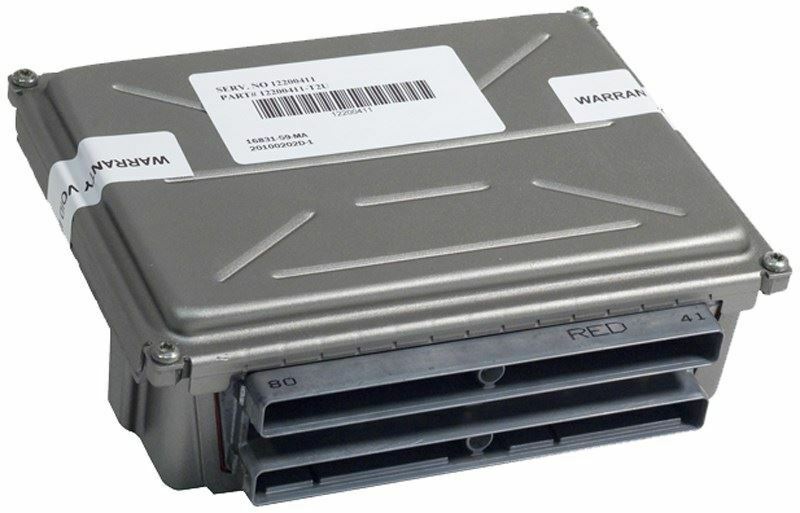Is Your 2004 Tahoe Running Rough? The PCM Might Be the Culprit.
If your 2004 Chevrolet Tahoe, or another compatible GM vehicle, is experiencing baffling issues like poor fuel economy, erratic shifting, a persistent check engine light, or even a no-start condition, the problem may lie deep within its electronic nervous system: the Powertrain Control Module (PCM). This component, often called the engine computer, is the brain of your vehicle’s operation, managing everything from fuel injection and ignition timing to transmission shift points and emissions controls. When it fails, the symptoms can be widespread and frustrating to diagnose.
This is a direct-fit replacement Powertrain Control Module, service number 12586242, for a wide range of 2004 GM trucks and SUVs. The best part? It arrives at your door pre-programmed with the latest official GM software, specifically calibrated to your vehicle’s unique Vehicle Identification Number (VIN). This eliminates the need for expensive trips to the dealership for programming, making the repair process faster, simpler, and more affordable.
From the Diagnostic Bay
We had a 2004 Sierra 1500 come in with a classic P0303 misfire code (Cylinder 3 Misfire). The owner had already replaced the spark plug, ignition coil, and even the fuel injector on that cylinder, but the misfire persisted. After hooking up our diagnostic tools, we noticed the command signal from the PCM to the cylinder 3 ignition coil was weak and intermittent. We swapped the coil with a known good one from another cylinder, and the problem stayed on cylinder 3. This confirmed our suspicion: the driver circuit inside the original PCM had failed. We installed one of these VIN-programmed modules, performed the security relearn, and the truck ran perfectly. It’s a textbook example of how a faulty PCM can mimic other component failures, costing you time and money on parts you don’t need.
Common Symptoms of a Failing 2004 Tahoe PCM
A failing engine computer can manifest in numerous ways. While a proper diagnosis is always recommended, here are some of the most common signs that your PCM is on its way out. If your vehicle is showing several of these symptoms, it’s highly likely the computer is the root cause.
- ✔ Check Engine Light: The check engine light is illuminated, often with communication-related trouble codes (U-codes) or codes for multiple, unrelated sensors.
- ✔ Engine Stalling or Misfiring: The engine may stall unexpectedly while driving or at idle. You might also experience rough idling or noticeable engine misfires.
- ✔ No-Start Condition: The engine cranks but refuses to start. This can be due to the PCM not commanding the fuel pump or ignition coils to operate.
- ✔ Poor Performance & Fuel Economy: A significant and sudden drop in gas mileage, along with sluggish acceleration, can point to incorrect fuel and air calculations by a faulty PCM.
- ✔ Harsh or Erratic Shifting: The PCM also controls the transmission. A bad module can cause hard shifts, delayed engagement into gear, or getting stuck in one gear (limp mode).
- ✔ Intermittent Electrical Issues: Because the PCM communicates with many other modules, its failure can cause strange, seemingly unrelated electrical problems throughout the vehicle.
The Plug-and-Play Solution
Replacing a modern vehicle’s computer isn’t like swapping out an alternator. Each PCM is programmed with specific software for that vehicle’s VIN, engine, transmission, and options. Our service simplifies this complex process. When you order, you provide us with your VIN. We then flash this module with the correct, updated software from GM. This ensures that when you receive the part, it’s ready for installation. While a security relearn procedure is typically required (a simple process you can often do yourself), the core programming is done, saving you hundreds of dollars in dealership fees.
This module is a direct replacement for service numbers 12586242, 19299226, 89017738 and broadcast codes such as YFKD, YFKF, YFKH, YFKJ, YFKX, YFXL, YFXM, YFXN, YFXP, and YHTN. It fits a huge range of vehicles including the Chevrolet Tahoe, Suburban, Silverado, SSR, Trailblazer EXT; GMC Sierra, Yukon, Envoy; Cadillac Escalade; Hummer H2; Buick Rainier; and Isuzu Ascender. Please verify your original part number to ensure compatibility.
Frequently Asked Questions
Do I need to get this programmed by a dealer?
No. We program the module to your vehicle’s VIN before we ship it. This handles the main software calibration. However, you will need to perform a security relearn procedure (also known as a key relearn or Passlock/VATS relearn) after installation so the module recognizes your vehicle’s anti-theft system. This procedure can typically be done without special tools and instructions are readily available online.
How do I provide my VIN?
After you complete your purchase, you can send us a message with your 17-digit Vehicle Identification Number (VIN). We cannot ship your order until we receive this information, as the programming is essential for the part to function.
Is this a simple plug-and-play installation?
It is ‘plug-and-program-play’. The physical installation is straightforward: disconnect the battery, unplug the electrical connectors from the old PCM, unbolt it, and install the new one in its place. After that, the security relearn procedure must be completed. For most DIYers, this is a very manageable job.
How do I find my original part number?
Your vehicle’s original PCM will have a sticker on it with the service number (SERV. NO.). On most 2004 GM trucks like the Tahoe and Sierra, the PCM is located under the hood on the driver’s side, near the battery and fuse box. You will need to match the service number on your old part to one of the numbers listed in this description to guarantee fitment.
Will this fix my vehicle’s specific problem?
This module will correct any issues directly caused by a faulty PCM. While the symptoms listed are very common for PCM failure, they can also be caused by other issues like bad wiring or faulty sensors. We always recommend a proper diagnosis by a qualified technician to confirm the PCM is the point of failure before ordering.


